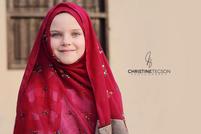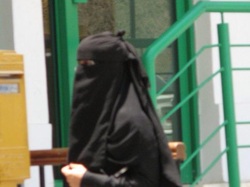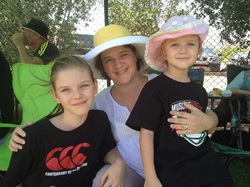 “Where are the women?” was my first thought driving through Muscat, the capital city of Oman. Groups of men sat outside rows of white shops and houses, chatting and drinking coffee, or kicking a soccer ball around, strolling along the beach. I spotted one or two women walking with their husbands and children, but for the most part there just weren’t any in sight. The Hungarian friend I was staying with explained that although the sultan of Oman has set rather lenient rules on dress and activity for Omani women (compared to many of Oman’s neighboring countries), tradition rules the cultural norm. Women mainly socialize in the house, and only are out for shopping or trips often escorted by their husbands or other male family members. And when they are out, their families require that they wear a black abaya – a long robe that covers their full body except for face, hands and feet. This was my first time in Muscat or anywhere in the Middle East, and I felt very out of place. I was constantly worried that I was exposing too much knee, and felt practically naked on the beach in a bathing suit. And while every Omani I met was polite about what I am sure they saw as indiscretions, I wondered what it was like for my friend living in this culture day to day and raising two girls (one a tween) and how she dealt with some of the culture shock that I only had to get used to for a week, but that she has dealt with for 6 years. My questions to her were, what is it like being an expat in Oman full time, and how does it compare to what is acceptable for Omani women. And in between these two worlds, is it a place a Western teenage girl can find herself. Here are a few excerpts from our interview.  An Omani woman in traditional dress. An Omani woman in traditional dress. What are the cultural norms for women in Oman? And are there state rules or family rules that most women must abide by? How do Omani women spend their time and does that vary by age? There are state rules that are equally for men and women like sex outside marriage is illegal. I am not aware that there are any laws just for woman. Sultan Qaboos, the ruler of Oman for the last 43 years, wants to keep traditions. For this reason Omani men and women have to wear traditional outfit for important meetings, celebrations, etc. It is white dishdasha with head dress for man and black abaya or traditional colored outfit for women. The original outfit for women was very colorful. At the countryside they still wear those beautiful colorful dresses with almost see through matching scarfs but it’s less frequent in Muscat. Around the time when we arrived the Sultan gave out a warning for tailors not to alter the cut of the traditional dishdasha. Seemed a bit funny. Although most Omani women cover their hair and wear black abaya it’s not regulated by the state. There is a very wide range how local women dress here from western clothes with uncovered hair to black abaya, covered face and sometimes even the eyes are covered by this scarf. Once I saw a family where the parents were in traditional clothes but their teenage daughter was dressed in western clothes without headscarf. It is not very frequent though. A white headscarf is part of the school girls’ uniform. Boys wear white dishdasha and kuma (traditional hat). Omani women are encouraged to study and work and be less dependent on man. A few years ago they passed a law that employers must provide rooms for breastfeeding mums if their baby is brought to them. There are great scholarships available for women to study abroad. Omani woman love to shop. The shopping centers are always packed on the weekends. They also spend a lot of time visiting family. My Omani colleague said that they spend every other weekend with her family. Younger Omani women are more modern, they go out for coffee and lunch, and spend a lot of time in spas and fitness centers. On the weekends whole big extended families go to the beach or to the park for a picnic. You have 2 daughters - one of which is entering her pre-teen years. How do you think it would be for her to be an adolescent expat girl in Oman? And what is life like for an adolescent Omani girl? Life can be quite restricted for adolescents here, both girls and boys. Due to the heat and distances they rely on their parents transporting them to meet friends, etc. Taxis are safe for boys but not so much for girls. For expat girls it can be hard that they are stared at or unable to wear the same clothes their age group wears in their home country. They can’t even go for a walk holding hands with their boyfriend. Man and woman are not allowed to hold hands or kiss in public. What is interesting is that it’s accepted that two men hold hands. Our oldest one is still happy here but we are already thinking about it that we might have to move away in a few years time somewhere where she can enjoy more freedom. Adolescent Omani girls spend their time mainly between school and family. So why do we want to move away for Luca’s teenage years? We are not really part of the local community here. Local women don’t come to us for a cup of coffee in fear our husbands might be home and that would not be appropriate. Small children are allowed to play with our children but once they reach adolescence they don’t mix anymore. They are very friendly but we are still a bit isolated. Their daily schedule is also very different from ours. In the hottest time in the afternoon they usually have a sleep/rest and are up till later than the western expat children. I would like the children to be able to socialize with a wider range of people than their school mates. As children are transported everywhere they are less mature than children elsewhere. It is true about being careful in the traffic, using public transport or understanding everyday dangers like talking to strangers or going somewhere with them. They are taught these but they rarely have to face any real situation. We would like Luca to go to university in NZ or England and would like her to be prepared for full independence.  Kata with her two daughters, Luca (left) and Szofia in Muscat. Kata with her two daughters, Luca (left) and Szofia in Muscat. How are expat women received in Oman - both tourists and those who chose to stay in Oman to live and work? Is there a difference? Expat women generally are respected. Sometimes this respect comes in strange forms. Our neighbor was very friendly with my husband but never even said hello to me in spite of that I occasionally visited his wife. When I mentioned it once someone explained that he is just being respectful. However most man are more open and happy to help foreign women. They are a bit more open toward tourists. If young guys get a bit too familiar it’s enough to mention the police to scare them away. I was told they would be punished paying unwanted attention to a woman whether expat or local. What were some of the culture shocks you went through when you moved to Muscat? When my husband applied for his current job in Muscat I hardly knew about the existence of the country and we had to look on the map to see where are we planning to go. When he was offered the position we did some research. We didn’t find much on dress code so decided to go with the suggestion of the Lonely Planet; conservative dressing, no shorts for men. We found that dressing is really relaxed but not always consistent. Once my husband was told off by the person renewing his car registration for wearing a casual T-shirt. The first shock was stepping out to the arrival hall [at the airport]. It seemed that there were only men there, most of them wearing pants and a long shirt of the same color. Later I learned that it was traditional Pakistani outfit. And they were all staring at us. It took some time to get used to people staring at us. They stared when we went to a local shop, driving by in a car, going to a restaurant rarely frequented by expats. At the time we arrived the temperature was well over 40 degrees Celsius. It was shocking to see the mainly Indian and Pakistani workers working outside in that heat. The funniest (and sad) was to see that when a western engineer went to do some inspection or measuring etc. a worker would follow him holding an umbrella above him. Strangely, although the people were so much worse off than us, I could never see hatred or envy in their eyes. By Suzette McLoone Lohmeyer
0 Comments
Leave a Reply. |
Archives
June 2017
Categories
All
|
 RSS Feed
RSS Feed